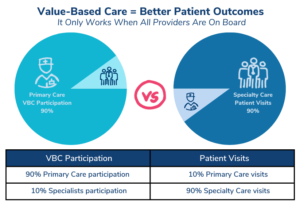Data-Driven VBC Improves Patient Outcomes
This article is one in a series that advocates the need to bring specialty care under value-based care payment models. Click here to read the previous article, CMS Innovation Center: Specialist Incentives for Value-Based Care.
Generally, Americans don’t have positive healthcare experiences. In a recent Beryl Institute study (as reported in Forbes), 76 percent reported that they have not had a positive encounter with a healthcare provider in the past three months, and 60% have had outright negative experiences.
69% of Providers Participating in VBC with Improved Outcomes
Primary-care physicians continue to increase their engagement with value-based care (VBC)—more than 69% are participating in VBC programs, according to the Chartis Group, and the patients of these providers are experiencing better outcomes. Hospitals that employ data analytics (a hallmark of VBC) are also improving patient satisfaction and outcomes—and saving money—according to the report by Beckers.
The numbers show that when data-driven value-based care is in place, patients benefit from the corresponding focus on holistic, whole-person care … and that’s great news for patients fortunate enough to be covered by VBC, the only money-saving, outcomes-driving healthcare delivery model out there. Unfortunately, the vast majority of patients don’t yet benefit from the proven-to-work concept of VBC.
What’s at Stake Without Value-Based Care
As much as VBC models are proving their value, they haven’t realized their full potential in the real world, across the board.
Despite efforts to apply technology and data to healthcare, too many patients still suffer, experience less-than-optimal outcomes, wait too long for an appointment (or in the waiting room), endure inconvenience, and continue to pay hefty prices—all for healthcare that’s often wanting.
Why? Not nearly enough providers are embracing Value-Based Care—particularly specialty-care providers.
The time is now to increase the number of patients benefiting from better outcomes and lower costs.
Getting the entire healthcare system under the VBC umbrella is important. As long as the majority of specialty-care providers are working on a fee-for-service basis—a system that pays based on volume of services provided vs. how well patients fare—all Americans will continue to suffer in the fallout.
The CMS Innovation Center strategy to incorporate specialists into value-based programs is critical to correct the disparity … and assure all patients are on the receiving end of an outcomes-based, data-driven approach to healthcare.
Fix the Broken Healthcare System with Value-Based Care
Value-Based Care is the solution to a healthcare system that, while making inroads, is still broken. Despite the fact that VBC is proven to benefit patients while allowing physicians and payers to do their jobs better, the system is broken. Why?
- Right now only 10% of care is delivered by primary care providers. While most PCPs participate in VBC programs, the care they provide accounts for a relatively small percentage of care provided.
- The remaining 90% of care is provided by specialists who, for the most part, are stuck in the fee-for-service paradigm. They’re used to getting paid based on volume of services provided (rather than results achieved), and that’s the way their practices are set up.

So, while Value-Based Care helps doctors take proactive approaches that result in better patient outcomes, reduced medical waste and cost savings, until it is applied across the board, impact will be minimal.
When all providers are incented to access real-time insights and trends (inherent under VBC), all patients can benefit from the latest treatment advances.
When both primary and specialty providers have the most up-to-date information at their fingertips, everyone can receive the holistic, whole-person care they deserve.
With Value-Based Care, everything comes together to give all involved just what they need—for more effective care, at a more reasonable cost.
With VBC, providers and patients benefit across the board, and the outcomes are better for everyone.
This article is one in a series that advocates the need to bring specialty care under value-based care payment models. Click here to read the next article, How Insights from Payer Data Improve Patient Care.
References:
5 ways health systems are utilizing data to improve patient care
 ASK ENLACE
ASK ENLACE